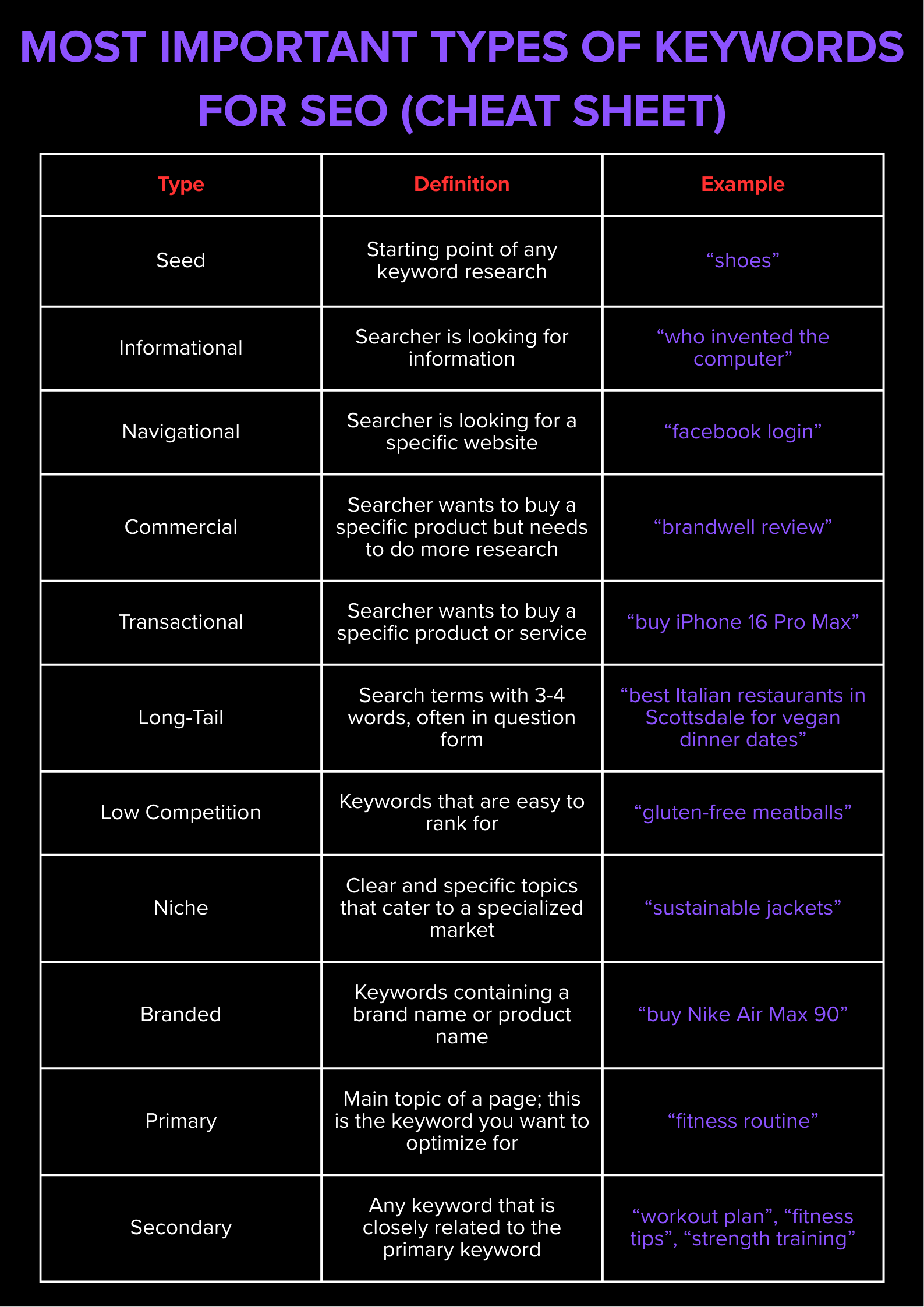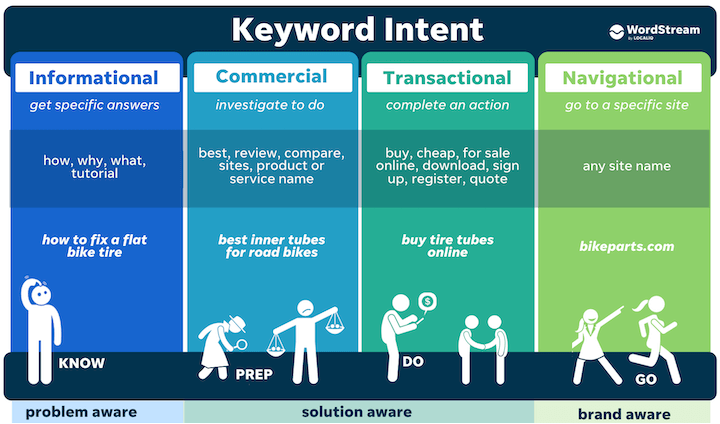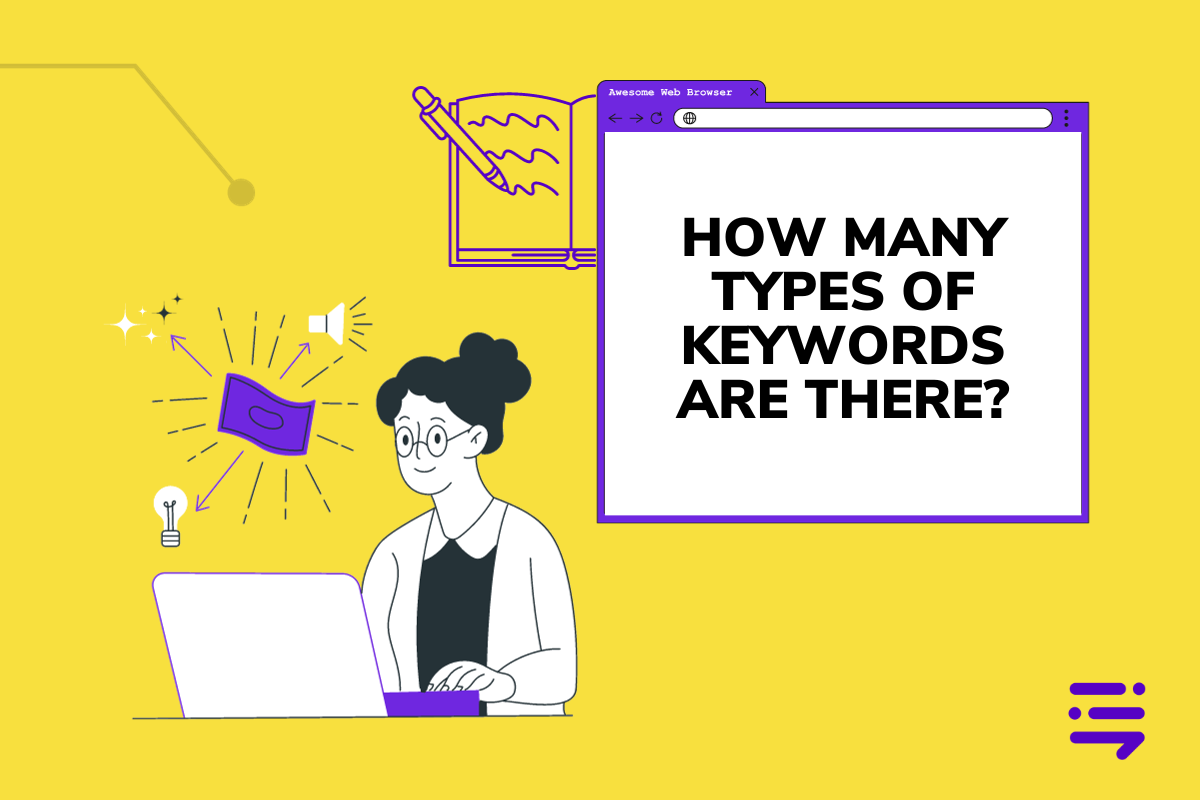So, you’ve launched your website. The design is sleek, the content compelling, and your excitement palpable.
You sit back, waiting for a flood of visitors to wash over your digital domain.
But the traffic trickles in at best. Your grand online debut feels more like a whisper than a roar.
Puzzled? Well, there’s one crucial element you might have overlooked: keywords. They’re not just phrases but signposts that guide users from their search queries right to your virtual doorstep!
The world of keywords can seem vast and confusing with different types popping up everywhere — short-tail keywords, long-tail keywords, primary keywords, intent keywords, LSI keywords, volume keywords, commercial keywords, match keywords … the list goes on.
But don’t worry! By learning the different types of keywords and how to use them effectively in SEO, you’ll get those digital roads buzzing towards your site in no time!
Let’s get started.
Table Of Contents:
- What Are Keywords?
- Four Types of Keywords
- Primary Keywords vs. Secondary Keywords
- Short-Tail Keywords vs. Long-Tail Keywords
- Product Keywords vs. Branded Keywords
- LSI Keywords
- Tips for Choosing the Right Type of Keyword
- Conclusion
What Are Keywords?
Keywords are the lifeblood of SEO and digital marketing. They’re like magnets that attract potential visitors to your site.
Keywords refer to particular words, phrases, or expressions that people type into Google when trying to find information online. These phrase matches play a vital role in connecting users with relevant content, products, or services on websites.
Every time we go to a search engine, we type different types of keywords. Whether it’s “best pizza near me” or “how to fix a leaky faucet,” these searches help us find what we need.
Importance of Keywords
You might be wondering why these seemingly ordinary words hold so much importance in digital marketing. The answer lies in their ability to drive targeted traffic — people who are likely interested in what you have to offer.
Incorporating relevant keywords into your web pages can make them more visible on search engines whenever someone conducts a related search. This is because search algorithms prioritize sites that contain high-quality content matching user queries — a.k.a. keywords.
Search engine optimization (SEO), as the name suggests, involves optimizing web content so that it ranks higher on search engine results.
But, there’s more to SEO than just throwing in a bunch of keywords. The real magic happens when you strategically place these words throughout your site — in titles, headings, meta descriptions, and throughout the content.

A quick guide to the most common types of keywords
Four Types of Keywords
Although there are eight types of keywords listed in the cheat sheet above, there are four main types of keywords based on search intent: informational keywords, navigational keywords, commercial keywords, and transactional keywords.
Informational Keywords
Informational keywords are the words or phrases that people use when they’re looking for information or answers on a particular topic. These keywords usually indicate that the searcher is in the research phase and wants to gather details rather than make an immediate purchase or take a specific action.
Let me throw in a couple of examples:
How to: “How to bake cookies” – Here, someone is seeking information on a specific skill or task.
Guide: “Beginner’s guide to photography” – This signals that the person wants comprehensive information on starting out in photography.
What is: “What is global warming?” – This indicates someone is looking for an explanation or definition of a concept.
Benefits of: “Benefits of meditation” – People are interested in understanding the positive aspects or advantages of a particular thing.
History of: “History of smartphones” – This suggests a desire for information about the past or the evolution of a subject.
If you’re creating content or doing SEO, paying attention to these informational keywords can help you tailor your content to what people are actively seeking.
Informational keywords are pivotal in shaping your content’s SEO strategy. You need these types of keywords if you want your content discovered by those hungry for knowledge.
Understanding how informational keywords work can give you an edge over competitors because they align with users’ intent and match their queries effectively. People love it when they find an exact match to their questions.
If you want to be found by Google’s crawlers, start focusing on crafting high-quality content centered around relevant informational keywords related to your niche or industry.
Remember: it’s not just about using any search phrase but a keyword that’s pertinent and valuable enough to both search engines and readers alike.
Navigational Keywords
Navigational keywords are the terms people use when they’re looking for a specific website or webpage. Essentially, these keywords help users navigate to a particular destination on the internet, like searching for a brand, a specific product, or a platform.
Here are a few examples:
Facebook login – Someone is looking to access their Facebook account directly.
Apple store – This indicates a search for the official Apple online store.
Amazon customer service – A user wants to talk to an Amazon rep.
Wikipedia Harry Potter – Someone is specifically looking for the Wikipedia page related to Harry Potter.
Navigational keywords are like digital compasses guiding users directly to their intended online destinations. They’re handy when you already know where you want to go and just need a quick route to get there.
Finding navigational keywords requires understanding how your audience perceives your brand and products. Regularly check search engine results pages (SERPs) for mentions and variations around those key phrases and fine-tune them over time.
For brands looking to improve their organic visibility, navigational queries should focus more on meta descriptions and title tags. They are the first touchpoint for users in search results, making them vital in attracting clicks from potential customers.
Remember that these keywords should not be forced but naturally integrated into your content to maintain readability.
While navigational keywords have their perks, they can sometimes restrict a brand’s reach. This happens because these keywords mainly target folks who already know about the website or products. That’s why it’s super important to strike a balance by also using other types of keywords for a broader appeal.
Commercial Keywords
Commercial keywords often hint at a potential shopper who’s somewhere in the middle of the buying journey.
Commercial keywords are phrases people use when they’re interested in purchasing a product or service but haven’t quite made up their minds yet. These keywords typically fall between informational and transactional keywords in the search intent spectrum.
The magic of these keywords lies in their power to draw potential customers who might be comparing products, looking for reviews, or seeking out the best deals.
Let’s delve into some examples:
Best laptop for gaming – This suggests someone is in the market for a gaming laptop and is likely comparing options.
Compare iPhone vs. Samsung Galaxy – Here, the searcher is in the process of weighing options between two specific products.
Discounted running shoes – Indicates an interest in buying running shoes but with a focus on finding a good deal.
Top digital cameras under $500 – Someone looking for a digital camera but with a budget constraint.
Reviews of electric toothbrushes – This points to someone looking for opinions before making a purchase decision.
Commercial keywords are like the window shoppers of the internet. They’re exploring, comparing, and looking for the best value before making a commitment. If you’re running an e-commerce site or creating content for product pages, paying attention to these keywords can help you capture the attention of potential buyers at the right stage of their journey.
Note that crafting content around commercial investigation keywords requires deep knowledge about your product or service and its market competition. You’ll need to address common questions buyers may have while also highlighting why your offering stands out from others available on the market. Add relevant facts and figures to your content to boost your credibility and help visitors make informed decisions.
Transactional Keywords
Transactional keywords are the power players of the search engine world. When people use transactional keywords, they’re typically ready to make a move — whether it’s purchasing a product, signing up for a service, or taking some other action that involves a transaction.
Here are some common examples:
Buy iPhone 12 Pro Max – This is as transactional as it gets. The user is ready to make a purchase now.
Sign up for Netflix free trial – Here, the searcher is ready to subscribe to a service and is actively seeking a sign-up option.
Order pizza delivery – A hungry user is ready to satisfy that pizza craving and is looking for a way to order it.
Book a flight to Paris – This indicates a user is ready to book a flight and jet off to the City of Lights.
Transactional keywords are like the finish line of the online journey. Users are ready to buy, and if you’re running an online store or a service-based business, optimizing for these keywords can help you capture those valuable conversions. They’re the ultimate call to action in the vast landscape of search queries!
Bear in mind that not all businesses can leverage transactional keywords effectively. Their utility depends largely on what you sell and how well those products align with searchers’ intentions.
The choice between these four types of keywords ultimately depends on your goal:
- Do you want to educate readers (informational)?
- Do you want to guide them toward a resource (navigational)?
- Do you want to help them make purchasing decisions (commercial investigation)?
- Do you want to encourage them to buy directly from you (transactional)?
Understanding these differences can significantly enhance the effectiveness of both organic and paid search campaigns.

Types of keywords based on user intent
Primary Keywords vs. Secondary Keywords
Primary keywords are the main focus of your content or SEO strategy. Head keywords are the core terms that best represent the main topic or theme you want your content to be associated with. They’re typically broader and more difficult to rank for
For instance, if you’re into fitness, “healthy lifestyle” could be a primary keyword.
On the other hand, secondary keywords are more specific and provide additional context or details related to your primary keyword.
Sticking with the fitness theme, if your primary keyword is “healthy lifestyle,” your secondary keywords could be “balanced diet,” “daily exercise routine,” or “mental well-being.”
In essence, primary keywords set the stage while secondary keywords add depth and specificity. When creating content or optimizing for search engines, having a mix of both satisfies a broader audience while also catering to those with more specific tastes. It’s all about finding the right balance for your goals.
Short-Tail Keywords vs. Long-Tail Keywords
Short-tail keywords are broad and general phrases that get straight to the point but might leave some room for interpretation.
For example, “fitness,” “travel,” or “technology” are short-tail keywords. These generic keywords are like the headline of a story – attention-grabbing but not always detailed.
On the flip side, long-tail keywords are more elaborate and specific. Unlike broad match keywords, these niche keywords typically consist of three or more words and provide a more detailed description of what the searcher is looking for.
Going deeper into our previous examples, “best fitness routines for beginners,” “budget travel destinations in Europe,” and “latest smartphone technology trends” are long-tail keywords.
Mid-tail keywords strike a balance: they are more specific than short-tail keywords but not as detailed as long-tail keywords. Think of them as the happy medium.
For instance, if “fitness” is a short-tail keyword and “best fitness routines for beginners” is a long-tail keyword, a mid-tail keyword could be “beginner fitness routines.”
These keywords aim to capture a more targeted audience than short-tail keywords while still maintaining a broader reach than long-tail keywords.
Short-tail keywords cast a wide net and can attract a large audience, while long-tail keywords are like a magnet for a more specific, niche audience. Your strategy might involve a mix of all three to ensure you’re reaching a broad spectrum of users while also catering to those with more refined search queries.
Product Keywords vs. Branded Keywords
Product keywords are all about what you’re selling. They focus on the specific products or services you offer.
For example, if you’re in the business of selling laptops, “gaming laptops,” “ultrabooks,” or “2-in-1 laptops” would be product keywords. These terms help you connect with users who are actively searching for the types of products you provide.
Branded keywords, on the other hand, are tied to your brand name. They include your brand, product names, or any unique terms associated specifically with your business.
For instance, if your brand is XYZ Electronics, a branded keyword would be “XYZ Electronics laptops” or simply “XYZ laptops.” These keywords are crucial for building brand awareness and capturing users who are already familiar with or interested in your brand.
Product keywords help you reach potential customers who might not be familiar with your brand yet, while branded keywords reinforce your presence among those who are already aware of you. It’s like having both a spotlight on your products and a beacon shining on your brand identity.
LSI Keywords
Latent Semantic Indexing or LSI keywords are terms or phrases that are semantically related to your main topic or primary keyword. They help search engines understand the context and theme of your content.
In simpler terms, LSI keywords provide additional context and make it clear what your content is all about.
For example, if your main keyword is “apple,” LSI keywords could include “orchard,” “fruit,” “healthy snacks,” or “apple varieties.”
Including LSI keywords in your content helps search engines understand the relevance of your material, making it more likely to show up in relevant searches.
So when you’re optimizing your content, sprinkle in some LSI keywords to create a well-rounded and contextually rich piece that stands out in the vast sea of information on the internet.
Tips for Choosing the Right Type of Keyword
Choosing keywords is a pivotal part of SEO strategy.
To pick effective keywords, you need to understand your audience first. Identify their needs and interests, then use this knowledge to identify search terms that they are more likely to type into Google.
Analyze Search Intent
The type of content people are searching for can guide your choice in keyword types. For example, informational searches may call for long-tail keywords while transactional queries might benefit from more specific product-related terms.
Evaluate Competitor Keywords
You should also take note of what your successful competitors are doing. Keyword research tools like Semrush, Ahrefs, and BrandWell can help identify popular industry-specific keywords and search terms that drive traffic to competitor sites.
Prioritize High-Value Terms
If possible, prioritize high-value terms with significant search volume but keep in mind that competition levels vary widely among different categories of search phrases.
Remember: there isn’t a one-size-fits-all solution when it comes to choosing the perfect set of target keywords; rather it requires careful consideration and research tailored specifically towards each unique situation.
Conclusion
SEO keywords are your website’s lifeline – guiding users from their search queries right to you.
The four types of keywords – informational, navigational, commercial, and transactional – all serve unique purposes, creating a cohesive and compelling narrative that resonates with both search engines and your audience.
Engage with transactional keywords when eager customers are ready to convert. Use informational keywords to guide those who are in search of knowledge.
Strike a balance with mid-tail keywords, offering the best of both worlds – specificity without sacrificing reach.
Elevate your SEO strategy with the powerful trio of product, branded, and LSI keywords. Showcase your offerings, establish your brand presence, and weave in latent semantic buddies that enrich your content with context.
Remember, SEO keywords aren’t just tools; they’re the keys to unlocking the full potential of your online presence. Choose them wisely, weave them strategically, and watch your digital story unfold with impact.
Want to find the best keywords for your niche and turn them into in-depth blog posts in an instant? Sign up for BrandWell today to start digging into those valuable keywords and build an entire topic cluster around them!




